
The Commodore 64, also known as the C64, is an 8-bit home computer introduced in January 1982 by Commodore International. It has been listed in the Guinness World Records as the highest-selling single computer model of all time, with independent estimates placing the number sold between 12.5 and 17 million units. Volume production started in early 1982, marketing in August for US$595. Preceded by the VIC-20 and Commodore PET, the C64 took its name from its 64 kilobytes(65,536 bytes) of RAM. With support for multicolor sprites and a custom chip for waveform generation, the C64 could create superior visuals and audio compared to systems without such custom hardware.
Commodore International Corporation was a home computer and electronics manufacturer with its head office in The Bahamas and its executive office in the United States founded in 1976 by Jack Tramiel and Irving Gould. It was the successor company to Commodore Business Machines (Canada) Ltd., established in 1958 by Tramiel and Manfred Kapp. Commodore International (CI), along with its U.S. subsidiary Commodore Business Machines, Inc. (CBM), was a significant participant in the development of the home computer industry, and at one point in the 1980s was the world's largest in the industry.
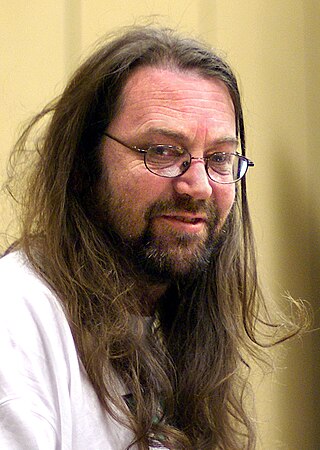
Jeff Minter is an English video game designer and programmer who often goes by the name Yak. He is the founder of software house Llamasoft and has created dozens of games during his career, which began in 1981 with games for the ZX80. Minter's games are shoot 'em ups which contain titular or in-game references demonstrating his fondness of ruminants. Many of his programs also feature something of a psychedelic element, as in some of the earliest "light synthesizer" programs including Trip-a-Tron.

The Commodore 16 is a home computer made by Commodore International with a 6502-compatible 7501 or 8501 CPU, released in 1984 and intended to be an entry-level computer to replace the VIC-20. A cost-reduced version, the Commodore 116, was mostly sold in Europe.

The Commodore Plus/4 is a home computer released by Commodore International in 1984. The "Plus/4" name refers to the four-application ROM-resident office suite ; it was billed as "the productivity computer with software built in".

The software program VICE, standing for VersatIle Commodore Emulator, is a free and cross platform emulator for Commodore's 8-bit computers. It runs on Linux, Amiga, Unix, MS-DOS, Win32, macOS, OS/2, RISC OS, QNX, GP2X, Pandora, Dingoo A320, Syllable, and BeOS host machines. VICE is free software, released under the GNU General Public License since 2004.
Chessmaster is a chess video game series, currently owned and developed by Ubisoft. It is the best-selling chess video game series, with more than five million units sold as of 2002. The same cover art image featuring Will Hare was used from Chessmaster 2000 to Chessmaster 9000.
CDS Software was an independent publisher and developer of computer game software based in Doncaster, South Yorkshire, UK.

Tynesoft Computer Software was a software developer and publisher in the 1980s and early 1990s.
The Toronto PET Users Group is one of the world's oldest extant computer user groups, and was among the very largest. The non-profit group is based in Toronto but has an international membership. It supports nearly all Commodore computers, including the PET, VIC-20, C64, C128, Plus/4, C16, C65, and Amiga, including the COMAL, CP/M and GEOS environments. TPUG is noted for its ties with Commodore Canada, its extensive and widely distributed software library, and its association with prominent computing pioneers such as Jim Butterfield, Brad Templeton, Karl Hildon, and Steve Punter.
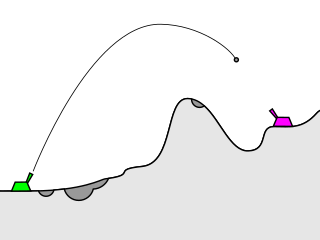
Artillery games are two or three-player video games involving tanks trying to destroy each other. The core mechanics of the gameplay is almost always to aim at the opponent(s) following a ballistic trajectory. Artillery games are among the earliest computer games developed; the theme of such games is an extension of the original uses of computer themselves, which were once used to calculate the trajectories of rockets and other related military-based calculations. Artillery games have been described as a type of "shooting game", though they are more often classified as a type of strategy video game.
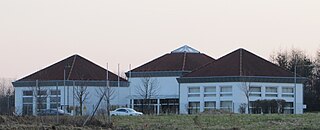
magnussoft Deutschland GmbH is a German computer game developer and publisher. The company is seated in Kesselsdorf, close to the Saxon capital of Dresden.

Colossus Chess is a series of chess-playing computer programs developed by Martin Bryant, commercially released for various home computers in the 1980s.
Atlantis Software was a London-based UK computer games publisher that released a number of games during the 1980s and early 1990s.
Commodore 64 joystick adapters are hardware peripherals that extend the number of joystick ports on the Commodore 64 computer. The additional joysticks can be used on games with dedicated support for the specific adapter.

Petro Taras Ostap Tyschtschenko is a German businessman best known for his work in the European market for the American computer company Commodore International.
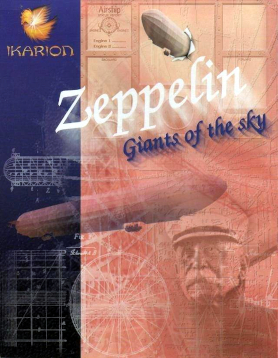
Zeppelin, also known as Zeppelin: Giants of the Sky, is a video game developed by German studio Ikarion and published by MicroProse for the Amiga and MS-DOS compatible operating systems in 1994.
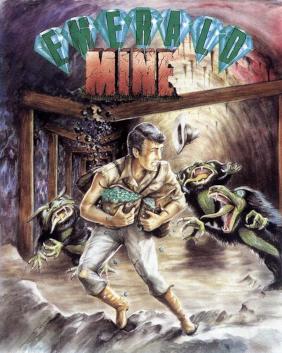
Emerald Mine is a 1987 puzzle video game developed and published for Amiga and Atari ST by Kingsoft. The series follows mines filled with various gems, such as emeralds. It is a Boulder Dash clone in which the player completes levels by collecting sufficient gems before reaching the exit. Emerald Mine was Kingsoft's best-selling title with reviews generally favorable, and spawned several sequels. It was also Volker Wertich's, one of the game's designers, most successful game until The Settlers in 1993, of which he was also the creator.
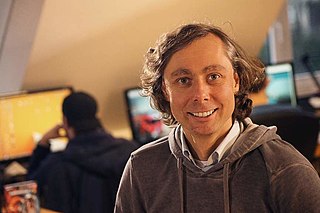
Ralph Stock is a German game designer. He is best known for his video games Mad TV and Emergency.

Vobis GmbH is a German computer hardware company and reseller of computer systems. During its tenure under Metro AG in the 1990s, it was the largest retailer of personal computers in Europe. The company also sells cell phones in Russia under the Highscreen name, a trademark used previously in the 1990s for its pan-European computer systems.














